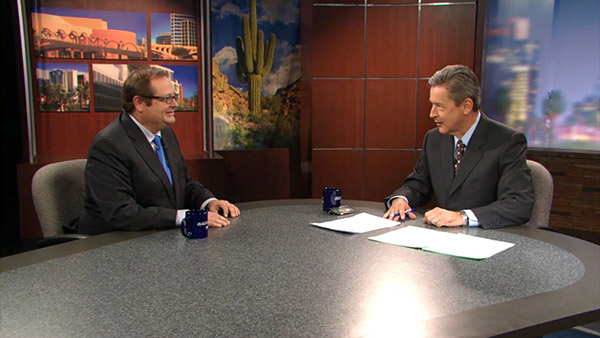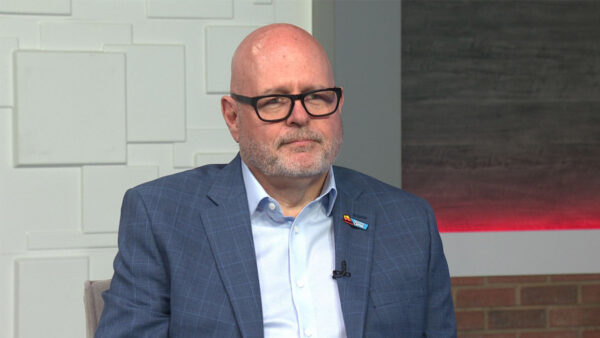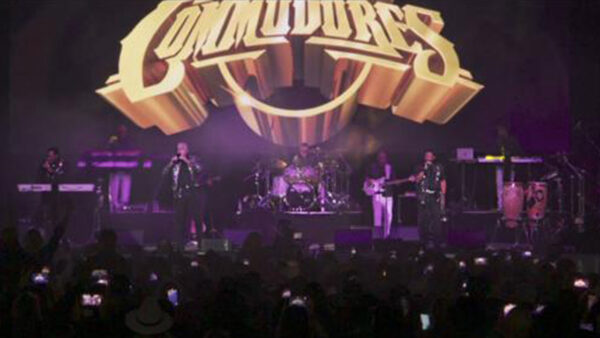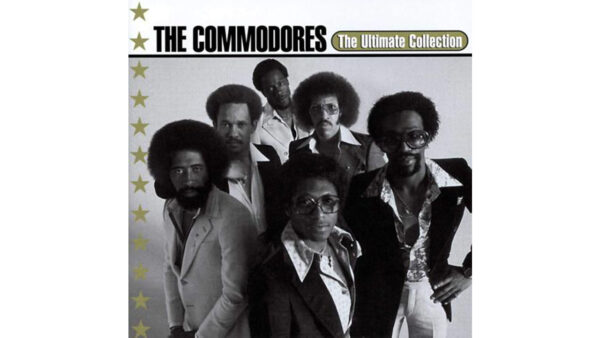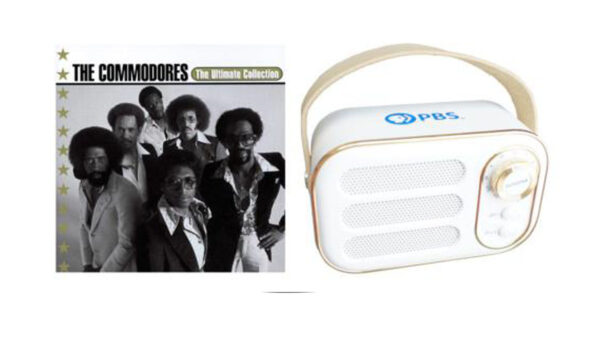The Behavior Research Center, an independent Phoenix-based firm that provides marketing and public opinion research, released results of two polls that focus on the public perception of the immigration population. Earl De Berge, Research Director with the Behavior Research Center, talks about the findings.
>> José Cárdenas:
Good evening, everyone. I'm José Cárdenas. Welcome to "Horizonte." New poll results reveal what people think about immigration and the Arizona Hispanic population. Also, a forum set to focus on the changing demographics in one East Valley city. Plus we'll tell you about a collection of works commemorating Dia De Los Muertos and nation's largest flamenco dance company coming to the Vally for an exclusive performance. And his newspaper column brings important issues to everyone's attention. We'll tell you how he also helps make a difference to kids in the community. All these stories coming up next on "Horizonte."
>>José Cárdenas:
We'll have these stories in a moment, but first some sad news to tell you about. Eduardo Roybal, who spent his political career, including three decades in Congress fighting for minorities, the poor and elderly, died of respiratory failure complicated by pneumonia Monday night at a Pasadena hospital. Roybal was elected to the House in 1962 and was the first Hispanic from California to serve in Congress since 1879. He also served more than a decade on the Los Angeles City Council. Roybal is survived by his wife and two children. Two new polls reveal people's perception about illegal immigration when it comes to the population and workforce in Arizona. The polls were conducted by the Behavior Research Center, an independent Phoenix-based firm that provides marketing and public opinion research. Nadine Arroyo takes a look at some of the results.
>> Nadine Arroyo:
Arizonans overestimate how many undocumented people live in the state and their exaggerated misinformation about illegals in the workforce ignites hostile feelings towards businesses who hire them. These are newly released findings from a recent poll conducted by the Behavior Research Center of Arizona. The Center surveyed Maricopa County adults for the Rocky Mountain Poll. In their results, poll responders estimated that 39% of Arizona Latinos are illegal immigrants. Yet according to the 2000 U.S. Census, only 28% are identified as non-citizens. And this percentage include people who are foreign nationals living in the U.S. legally. Also in their findings, Arizonans believe about half of Arizona Hispanics speak very little English, but the Center surveyed 4,000 Latino heads of households in the state and the results reveal that 80% are English speakers. The poll also revealed one interesting fact... 38% of poll respondents would favor a state law that would that take away business licenses from companies that hire illegal aliens. And a surprising 51% said they wouldn't. Overall, according to the study, public debates, news coverage and even political issues overwhelmingly cloud the realities of the Latino population than to clarify them, both locally and nationally.
>> Jose Cardenas:
Joining me to talk about these poll results is research director for the Behavior Research Center Earl de Berge. Earl, it's good to have you back on "Horizonte."
>> Earl de Berge:
Good to be here, Jose Cardenas .
>> Jose Cardenas :
Just a quick statement about what Behavior Research Center is and its particular focus on Hispanic issues in Arizona.
>> Earl de Berge:
We've been studying public opinion in Arizona for about 40 years now and have had a real intense interest in the Latino community because we see its growth over the years and have ramped up in the last 20 years, probably the most information that anybody has on the nature of this market with respect to its views and it attitudes and its characteristics, and so just been a kind of labor of love, if you will.
>> Jose Cardenas :
How was this particular poll conducted?
>> Earl de Berge:
This survey is done twice a year, and what we do is we take a look at a cross section of Latinos across Arizona without respect to their language skills. We survey them in every census tract across the state, and the only thing that is required to get into the study is for them to say that they consider themselves to be of Latino ancestry.
>> Jose Cardenas :
As I understand, it was one poll but you had basically two areas of focus. Tell us about that.
>> Earl de Berge:
Well, in this particular poll we were interested in two issues, both of which are relatively interconnected. The fundamental question addressed the matter of what the population believes to be the overall characteristic of the Latino population with respect to what proportion of them are citizens, what proportion of them are illegal aliens. The second set of questions we looked at had to do with the workforce and what the perceptions are of the public with respect to the involvement of illegal aliens in the workforce in Arizona.
>> Jose Cardenas :
We saw in the numbers that were shown on the intro piece some wide disparities between perception and reality. Did that surprise you?
>> Earl de Berge:
The scope of it surprised us. We had no doubt in our mind given the nature of the political debate and media coverage of the illegal alien issue in Arizona that there had to be some misperceptions about it. We had no anticipation, however, it would be as great as it is. Quite literally we found on the employment front, for example, that the public in Arizona believes that almost 4 out of every 10 persons in the workforce, in the non-governmental workforce in Arizona, is an illegal alien. That projects to an enormous figure. Actually, it projects to a figure that's almost 75% of the entire Latino population. And those kinds of misperceptions --
>> Jose Cardenas :
On that one, as I understand it, the reality is 70% of the Latino population in Arizona are actually U.S. citizens.
>> Earl de Berge:
Actually 73 or 74% according to U.S. Census estimates are U.S. citizens. Another significant percent of the people who are here as non-citizens are here with legal papers or they're in education or they're travelers or whatever. I don't think anybody has an exact estimate of what -- of the total population what the illegal population, immigrant population is. We think it's around 9%, maybe 10.
>> Jose Cardenas :
How much of this is a reflection of public concern about illegal immigration?
>> Earl de Berge:
I think it is a reflection of that to be sure, but more so it's a reflection of the nature in which the illegal immigrant stories have been covered. I think that the emphasis has been on describing Latinos, perhaps unintentionally and let's give everybody the benefit of the doubt, but has been focusing on this issue and the result has been that it has led the public to believe, very large segments of the public to believe, that the majority of Latinos in this state are in fact either first generation or illegal, and -- nothing could be further from the truth. In fact, most are in fact either native born in Arizona or immigrated here from other states in the United States or have become naturalized citizens. As I said, somewhere in the neighborhood of 72, 75%.
>> Jose Cardenas :
Do you think if we had done this poll 10 years ago we would have had this disparity --
>> Earl de Berge:
We did this poll 10 years ago and we did take a look what people thought about it and there was nowhere near the inclination to make those kinds of judgments. The illegal problem was perceived to be quite small. Now reality, of course, is that it has grown. Illegal immigration has grown in the United States, certainly in Arizona.
>> Jose Cardenas :
But are you saying that things such as the coverage of the Minutemen on the border, statements like Representative Pearce's about Mesa looking like a third world country, is that something that contributes to these misperceptions about the numbers?
>> Earl de Berge:
Absolutely. And the rub in it all is that we're at a point in time in our history when we're very likely to be voting for candidates and for measures on the ballot that will deal with how we address the illegal alien issue and how we address other civil rights issues that may affect Latinos and other populations as well. Our conclusion out of this is that we're in a difficult time. We're in a time where the public has been led to believe that literally half of Latino population or more are illegal aliens, and the view of illegal aliens is extremely negative for reasons that may be valid, may be not. But I think it's created an environment for public debate that can easily lead us to making decisions that aren't appropriate for the populations that live in this state, that are U.S. citizens and are good law-abiding, tax-paying folks.
>> Jose Cardenas :
You mentioned voting. So what does this portend for election results in terms of anti-immigrant ballot measures, in terms of candidates who are running on a "I will stop immigration" or "illegal immigration" platform?
>> Earl de Berge:
I think on the side of those people that are really angry about illegal immigration, it's going to activate some votes on that side. But I think the more profound result is going to be to trigger a lot of political action and growth in political action in among young people and other Latinos in this state to this point in time have been relatively quiet. They now represent 25, 27, 28, some cases, 30% of the population, depending on where you are in the state, and it's a body of people that don't, from what we can tell in our data, really don't appreciate being characterized in this fashion. I expect to see, and I think we're going to see as early as this coming election, a much greater level of activity amongst Latino voters and the emergence of new leadership that really is articulate and going to make themselves felt in the political marketplace.
>> Jose Cardenas :
Let's dissect that a little bit. You've got -- you're saying there will be people who will resent kind of being portrayed this way as being here illegally and so forth, being a drain on the economy. But will that make them more inclined to vote against anti-immigrant measures or more in favor of them so that they distinguish themselves? Prop 200 is an example perhaps of a significant number of Hispanics voting for Prop 200.
>> Earl de Berge:
I think the realization is more likely to go in the direction of they need to get control of the political debate, and I don't know that it's going to be specifically they're there to vote for or against an immigration issue as they are to make themselves more generally felt in the marketplace, in the school board level, in the city council level, and at the congressional level and other state elected offices in this state. I just expect to see a lot more activity. People say, look it, we can't just fight the immigration battle because it's really not our battle. We view ourselves as like everybody else, we have a lot of issues we're concerned about, but we don't like having characterized in a fashion that only looks at that issue. So I just -- I think they're thirsty for involvement in political process in general.
>> Jose Cardenas :
So you would expect to see, for example, more Hispanic candidates running for office?
>> Earl de Berge:
I do expect to see that, yes.
>> Jose Cardenas :
Let's talk about some of the specifics on here. The language misperception, talk about that.
>> Earl de Berge:
That's a fascinating one. We have been doing studies on language skills amongst Latinos in Arizona for many, many years and 80% of Latinos in Arizona, it's one of the highest actual rates in the country, speak English. And about 58 to 59% speak Spanish. This traces to the reality that, as I said earlier, most Latinos are native born, but more importantly than that, if you take a look at national data and local data you'll discover that one of the great energies in the average Latino is to learn English. We don't need an English-only law to spur them to do that. By the time a person moves from first generation to second generation, their preference for the Spanish language media will literally drop to 1 or 2%. They will use English language media more heavily, television, radio, print. All of it.
>> Jose Cardenas :
Earl, but what accounts for the fact that Univision, the Spanish language TV station, is the number one rated TV station in the Valley?
>> Earl de Berge:
There are a lot of stations and a lot of non-Spanish speaking audiences divided across all those, but the real reason is, I think, that Latinos can use -- they go back and forth and have a lot of choice. They have more choices with respect to what entertainment they tap into than anyone else. And furthermore, they still have an affection for the Spanish language. It's a language that they enjoy, they love. Many of them are bilingual, 30, 40%, and why shouldn't they tap into that, and I think the stations benefit from the fact they have a large core of people who are only Spanish speakers, about 20%, and then you've got another 30% who are bilingual. They're using all those media so the stations benefit from that.
>> Jose Cardenas :
Now, in recent weeks you had the "Republic" running a week-long series of articles on immigration. This week the "Tribune" is doing something similar. What is the role of the media in terms of dealing with these perceptions or misperceptions of the Hispanic population?
>> Earl de Berge:
Well, I really have to applaud both of them for what they've done, and some of the electronic media as well in recent weeks. I think that we do, all of us, people that are in polling, people that in the media, people that are covering the news, really do have responsibility to recognize that this is a very complex and a very large population that has many, many different characteristics. I think what the articles in the "Tribune," most recently this week, and the "Republic" last week, have done is really helped put a face on the American Latino, the Latino experience that is uniquely American and that is something that we really celebrate in this state and that they do. And I think by showing that, it helps a lot and get into dampen these views that all Latinos are illegal aliens.
>> Jose Cardenas :
Earl, we've got about 30 seconds left. I understand you've got another very interesting survey under way right now. Tell us about it.
>> Earl de Berge:
We're in the field trying to get a handle on actually both native borns and non-native born Latinos in Arizona, where they come from, how long they've been here, where they're going and what their ambitions may be. And I think we'll just add that to the mix and hopefully it will stimulate some interest and greater understanding between people who are and are not Latino.
>> Jose Cardenas :
And hopefully we'll have you back to talk about that one.
>> Earl de Berge:
That will be fun.
>> Jose Cardenas :
Thanks for joining us. Tonight you'll meet another Valle Del Sol honoree, people recognized for their impact on the Latino community. You may have seen him as a guest on "Horizonte." He's newspaper columnist who has made a career of telling important and interesting stories. Outside the office he makes another contribution to the community. 12News anchor Lin Sue Cooney introduces you to Richard De Uriarte.
>> Lin Sue Cooney:
Many in the Valley know his work well. Meet Richard De Uriarte, columnist for "The Arizona Republic." Passionately writing about a variety of important topics, especially those affecting the Hispanic community. But now the tables are turned. As an award winner, Richard is more reluctant.
>> Richard De Uriarte:
First of all, my thought was, did they run out of people? Because I don't consider myself much of an activist or a changer of lives or events.
>> Lin Sue Cooney:
But tell that to the children at this South Phoenix Boys & Girls Club where Richard has helped change lives for more than a decade. It's here where he coaches basketball and heads the club's newspaper project. Richard's philosophy is simple... every child has endless potential given the chance.
>> Richard De Uriarte:
If you're prepared, maybe you can do better than even people who might have more gifts. I know this well. So, you start to try to impart knowledge and life lessons through coaching.
>> Lin Sue Cooney:
And his influence speaks volumes. Staff here credit Richard for improved reading scores in some children.
>> Student:
He got me into the reading the newspaper because I never read the newspaper before.
>> Lin Sue Cooney:
They say his example encourages them to achieve in life.
>> Lady:
They begin to realize they have a voice, they have an opinion, and it matters, and the best way to make your point is start reading and making sure your facts are right. Those kids are going to learn something every day now.
>> Student:
He cares about us a lot. He really likes coming out here with us.
>> Student:
It's cool because he's doing like projects with us, and he takes his busy time to come and work with us.
>> Lin Sue Cooney:
Despite the accolades, Richard De Uriarte is humbled by the attention. His only hope... his lessons continue to make an impact and more children are given the chance they need to thrive.
>> Richard De Uriarte:
We all stand on other people's shoulders. You think that you accomplished all this stuff and we didn't. In that way, then the chain keeps going. You keep putting a hand out. My legacy will be in the people I know, the people I've helped.
>> Jose Cardenas :
Richard says he's learned as much from the children as they do from him. One lesson he says we can all absorb is how children from all races and background can be true friends without bias or agenda. A changing community is this year's theme for an upcoming town hall in Mesa. Joining me to talk about the town hall is David Luna. David is from the Mesa Association of Hispanic Citizens and co-chairman of the event. David, thank you for joining us on "Horizonte."
>> David Luna:
Thank you, Jose Cardenas . It's a pleasure to be here.
>> Jose Cardenas :
Tell us a little bit about the background of the Mesa Association of Hispanic Citizens.
>> David Luna:
The Mesa Association of Hispanic Citizens has been an organization since 1988. It started in 1988 as a grass roots effort for area Latinos to begin to look at opportunities in terms of leadership, educational opportunities for Latinos. And the whole notion of the group is to try to motivate Latinos within the community to seek those kind of roles.
>> Jose Cardenas :
So it's been in existence since '88, but this is only the fourth annual town hall. What was the genesis for the first one?
>> David Luna:
The reason why we decided to have a town hall is because in District 4, which is predominantly Latino, there were no viable candidates running for office that represented a large majority of Latinos in that area. So what happened is that we had local chancellors and local leaders, Teresa Bryce-Heams one of them, decided to convene or -- a group of local Latinos to talk about why there weren't viable candidates running for office. So as a result of that, they decided to create this group and out of that group emerged four issues. One was neighborhoods. One was leadership. One was education and economic development.
>> Jose Cardenas :
This is what came out first town hall?
>> David Luna:
This is what came out of the first town hall. We continued on with that process. We felt those were major issues that needed to be discussed in the City of Mesa.
>> Jose Cardenas :
What about town halls two and three, what did you see coming out of those?
>> David Luna:
We again moved those issues forward. They were essential. We felt those issues were continued -- continue issues that we needed to discuss. And what changed is the neighborhoods. We never -- we decided not to continue on with the neighborhoods but to look at youth because we feel that certainly, of course, the youth is the future of Latinos in the City of Mesa. So we decided to focus on areas specifically designed for youth.
>> Jose Cardenas :
Changing community is the theme of this year's town hall. What are you getting at when you say that?
>> David Luna:
We want to illustrate to our Latino leaders and also the City of Mesa that Mesa is a changing community. We see the demographics that are changing. There has been are articles in the "East Valley Tribune" talking about a community in transition. And that's a real interesting concept if you look at the City of Mesa. It's evolving, it's dynamic, and it really represents what's happening in Mesa. When I arrived here in 1988, one out of 10 people in Mesa were Latino. Today we find that 4 out of 10 -- 4 out of -- 1 out of 4 people in Mesa is Latino. So we certainly see a community that's really changing.
>> Jose Cardenas :
Some would say that's not necessarily good thing. Right or wrong, you get comments like Representative Pearce's that Mesa now looks like a third world country. Seems to be a reference to more of an immigrant population. Is that going to be part of the discussion at this Latino town hall?
>> David Luna:
Well, one of the things that we need to understand as we look at Mesa, it's a large community. There's 450,000 people that live in the city. It includes a variety of diversity. There's diversity of individuals that live in the city. They all bring the richness into the community. Yes, it's one of the issues that we're going to be talking about. We're going to talk about economic development. We want to encourage more Latino development and more economic and business development within the City of Mesa. We certainly want to encourage that. We also want to encourage leadership in the City of Mesa.
>> Jose Cardenas :
One of the things that's been talked about in the newspaper article series we talked about in the last segment was maybe some tension between Mexican families have that lived in the Valley for long time, perhaps for generations, of which there are many in Mesa, some very prominent Mexican families, and then the newer immigrants. Is that an issue to be discussed at the town hall?
>> David Luna:
We're not going to be talking about those issues. What we want to really focus on is trying to bring parents aboard in terms of their educational opportunities. We want to be able to bridge what's going on in the communities with the schools. That's one of the issues we're going to be dealing with. We also want to again, as I mentioned previously, we want to expand opportunities available for business development with the City of Mesa. We also want to encourage Latinos that have lived in Mesa for quite a number of years to participate in the -- in joining city councils and boards and commissions around this state as well.
>> Jose Cardenas :
Now, the last set of elections in Mesa was kind of disappointing, at least in terms of the Hispanic candidates. You had a very well qualified person in Teresa Brice-Heames, soundly beaten by the incumbent Mayor. You had one (indiscernible) running for school board also lost by a significant number. Discouraged, encouraged, what are you going to say about that at this town hall?
>> David Luna:
We certainly are not discouraged. We want to continue to press forward because we believe that there is great leadership within the Latino community. We have had (undiscernble) who is Latino herself who will be running in District 4. So that's a real encouraging. We were going to move forward and press on and continue until we can get some adequate Latino representation in the City of Mesa.
>> Jose Cardenas :
Is there anything else going on in terms of grooming Latino candidates for political office in Mesa?
>> David Luna:
Again, we have invited representatives from the city government as well as representatives from the governor's office to talk about involvement in boards and commissions. One of the things that we did this summer through the leadership track is that we had -- actually had a candidate workshop where we discussed strategies in terms of having -- having for those individuals that want to run for office. So we did offer that workshop and that was really interesting, and we had great participation.
>> Jose Cardenas :
David, you got some pretty interesting speakers for this town hall. Tell us a little bit about them. We have about 40 seconds.
>> David Luna:
I think what I'm really excited about is Luis Nava, one of the (indiscernible) four students who is going to be talking to educators, motivating them to continue to work hard with the new immigrants as they come into the country irrespective of immigration status. So we're really looking forward for him speaking to educators and motivating them. We're also going to have Ed Pastor hopefully. He will be addressing the educators in terms of moving his legislation forward in Congress.
>> Jose Cardenas :
Congressman Pastor, talking presumably about the Dream Act.
>> David Luna:
Absolutely. We're hoping to have him present to talk about that.
>> Jose Cardenas :
Well, David, best of luck on this year's Latino town hall.
>> David Luna:
Thank you so much.
>> Jose Cardenas :
Thank you for joining us. The Mesa Latino town hall is this Saturday October 29th at Mesa Community College from 7:30 in the morning to 1:00. This month we want to introduce a new segment we're calling "Horizonte: Sounds of Cultura," SOC. At the end of each month we'll tell you about upcoming community events you and your family can enjoy. Tonight, a celebration for the dead and the music and dance of flamenco comes to the stage.
>> Toy:
I see you.
>> Nadine Arroyo:
Halloween is almost here and that leads to scary and fun events around the Valley. But there's one Hispanic tradition that's celebrated at the same time but with its own traditions, el Dia De Los Muertos, or Day of the Dead. Its skulls, skeletons and folk tales leave everyone on edge. Places throughout the Valley, including museums, community centers and restaurants, are getting into the fun, including the Mesa Arts Center in downtown Mesa. The artist collection have a contemporary exhibit honoring this event. It includes spiritual depictions of Mexican culture and influences created by Valley artists, including Joe Ray, Annie Lopez, Jeff Falk and Martin Moreno. Moreno's Heaven's Border is a tribute to the many who have suffered and a sign of peace as they enter the next world. Ray's pays homage to the friends and families who have died and influenced his life. As spooky as this may seem, it's really all about tradition. Many believe Day of the Dead is a day of horror, ghouls, goblins and monsters, but in reality, Day of the Dead, or Dia De Los Muertos, is a Mexican celebration when many celebrate and remember loved ones who have died. They prepare special foods, decorate cemeteries and even have parades. It's their belief that the spirit of the dead come out and visit their families on October 31st and leave on November 2nd. Well, here in the Valley, many of these beliefs are kept alive. The exhibit is open through November 27. And after celebrating el Dia De Los Muertos, how about livening things up a bit with some foot-stomping, hand-clapping Espanola fun? The nation's largest flamenco dance company is giving the Valley an exclusive appearance. They are performing at the Chandler Center for the Arts on Saturday November 12. The group will perform traditional dances such as the romantic Tango and the dramatic and expressive dance solea. The company will have two performances on November 12th. And that's our "Horizonte: SOC."
>> Jose Cardenas :
If you have an event for our new segment SOC, e-mail us at our web site www.azpbs.org and click on "Horizonte." On the site you will also find transcripts and other information on upcoming shows. I'm Jose Cardenas Cardenas. That's all for "Horizonte" tonight. We'll see you next week. Have a good evening.
Earl de Berge: Research director, Behavior Research Center;
